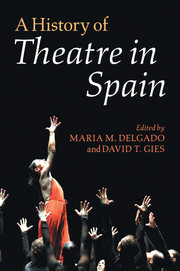Book contents
- Frontmatter
- Contents
- Illustrations
- Contributors
- Acknowledgements
- Introduction
- 1 The challenges of historiography
- 2 Lope de Vega, Calderón de la Barca and Tirso de Molina
- 3 The world as a stage
- 4 Playing the palace
- 5 The art of the actor, 1565–1833
- 6 Theatrical infrastructures, dramatic production and performance, 1700–1759
- 7 Popular theatre and the Spanish stage, 1737–1798
- 8 Theatre of the elites, neoclassicism and the Enlightenment, 1750–1808
- 9 Actors and agency in the modern era, 1801–2010
- 10 Zarzuela
- 11 Nineteenth-century Spanish theatre
- 12 Copyright, buildings, spaces and the nineteenth-century stage
- 13 Modernism and the avant-garde in fin-de-siècle Barcelona and Madrid
- 14 Continuity and innovation in Spanish theatre, 1900–1936
- 15 Theatrical activities during the Spanish Civil War, 1936–1939
- 16 Theatre, colonialism, exile and the Americas
- 17 Theatre under Franco (1939–1975)
- 18 Flamenco
- 19 Nationalism, identity and the theatre across the Spanish state in the democratic era, 1975–2010
- 20 Directors and the Spanish stage, 1823–2010
- 21 This evolution is still ongoing
- 22 Theatre as a process of discovery
- 23 Theatre is the art of the future
- Select bibliography
- Index
- References
3 - The world as a stage
Politics, imperialism and Spain's seventeenth-century theatre
Published online by Cambridge University Press: 05 June 2012
- Frontmatter
- Contents
- Illustrations
- Contributors
- Acknowledgements
- Introduction
- 1 The challenges of historiography
- 2 Lope de Vega, Calderón de la Barca and Tirso de Molina
- 3 The world as a stage
- 4 Playing the palace
- 5 The art of the actor, 1565–1833
- 6 Theatrical infrastructures, dramatic production and performance, 1700–1759
- 7 Popular theatre and the Spanish stage, 1737–1798
- 8 Theatre of the elites, neoclassicism and the Enlightenment, 1750–1808
- 9 Actors and agency in the modern era, 1801–2010
- 10 Zarzuela
- 11 Nineteenth-century Spanish theatre
- 12 Copyright, buildings, spaces and the nineteenth-century stage
- 13 Modernism and the avant-garde in fin-de-siècle Barcelona and Madrid
- 14 Continuity and innovation in Spanish theatre, 1900–1936
- 15 Theatrical activities during the Spanish Civil War, 1936–1939
- 16 Theatre, colonialism, exile and the Americas
- 17 Theatre under Franco (1939–1975)
- 18 Flamenco
- 19 Nationalism, identity and the theatre across the Spanish state in the democratic era, 1975–2010
- 20 Directors and the Spanish stage, 1823–2010
- 21 This evolution is still ongoing
- 22 Theatre as a process of discovery
- 23 Theatre is the art of the future
- Select bibliography
- Index
- References
Summary
The commercial theatres
In the countries bordering the Mediterranean the last decades of the sixteenth century were characterised by an economic upsurge, which continued throughout the following century. The rise of the great cities created both an economically deprived underclass and a more affluent sector of society. Spain participated in this general movement, and, although the rate of economic development declined in the last two decades of the century (a period of high prices in the Peninsula), the expansion continued after 1600. The birth and growth of commercial theatres in Spain took place during this period, which also marked the beginning of the decline of the great empire built in less than a century by the descendants of the Catholic monarchs.
Preserved among the papers of the Council of Castile in Spain's National History Archives are the minutes of the weekly Friday Consultation meetings at which petitions from all over Castile were examined. Those for the years 1576–93 contain many references to the failure of crops, the need to expand agriculture by increasing the acreage under the plough, the effects of natural calamities and the swelling numbers of beggars, orphans and foundlings. They also record the foundation and establishment of hospitals and other charitable institutions, many of which were funded by members of the emerging middle class. The charitable associations (cofradías), or brotherhoods, which maintained these hospitals soon realised that the newly built commercial theatres could be an important source of income for their institutions. By 1560–70 the possibility of drawing income from such a source had already occurred to the brotherhood responsible for the Hospital of St Joseph in Valladolid. This initiative spread rapidly through the Peninsula, and became the primary force, as well as the moral justification, behind the theatrical explosion that characterised the last two decades of the sixteenth century.
- Type
- Chapter
- Information
- A History of Theatre in Spain , pp. 57 - 78Publisher: Cambridge University PressPrint publication year: 2012



